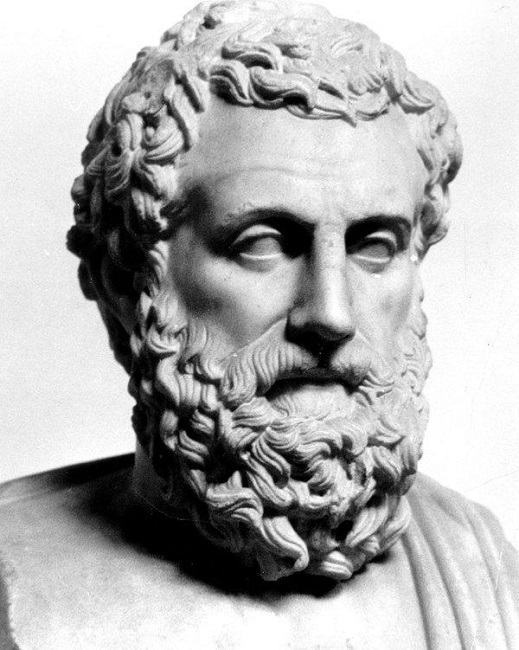The history of philosophy. Forms are the qualities of things
story·@godflesh·
0.000 HBDThe history of philosophy. Forms are the qualities of things
 [image source](https://www.nytimes.com/2016/05/27/world/europe/greece-aristotle-tomb.html) # Forms are the qualities of things Once clarified his attitude to the teachings of Plato, Aristotle found that the reality consists of individual objects, in which the form and substance are fused in unity. Substance is the matter from which the subject is made, until the shape determines its specific characteristics. A hen flew before our eyes. The shape of chicken means flutters to chuckle to lay eggs, so it gives the basic generic properties of chicken - that is, what it does. If the hen dies and stops cuddling, then the shape of the hen ceases to exist. The only thing left is the chicken, but it's not a hen. As we mentioned, Aristotle was interested in the changes in nature. Matter or substance is always an inherent opportunity to achieve a certain form. In summary, the substance strives to realize an inherent possibility. Every change in nature, according to Aristotle, is a transformation of matter from opportunity to reality. I will try to explain this with a joking story. Once upon a time there was a sculptor bent over a huge granite block. Every day he ditched and dug the shapeless stone until a little boy had visited him. "What are you looking for in the stone?" He asked. "Wait," said the sculptor. After a few days the boy returned and saw that the sculptor had beautified a beautiful horse from the granite block. The boy silently stared at the horse, then turned to the sculptor and asked, "How did he know he was hiding inside the stone?" Yes, where did he know? In a sense, the sculptor saw the shape of a horse in the granite block. Because this granite block was inherently the ability to become a horse. Aristotle believed that the possibility of realizing a certain form is inherent in all things in nature. The shape of an object tells us what its possibilities are, but it also shows its boundaries. When Aristotle speaks of "form" and "substance", he refers not only to living organisms. As the shape of the chicken is expressed in a chuckle, fluttering wings and lay eggs, the shape of the stone is falling to the ground. Just as the hen can not refrain from cuddling, so the stone can not refrain from falling. Of course, we can pick up and throw a stone high in the air, but since the nature of the stone is falling to the ground, you can not throw it on the moon. # Target reason Aristotle had a very remarkable view of causality relationships in nature. In everyday life, when we talk about the causes of one or another event, we mean exactly how it happened that it happened. The window is broken because we have cast a stone on it. The shoe is created because the shoemaker stitches several pieces of leather. But Aristotle believed there are several types of reasons in nature. First of all, it is important to understand what he meant to say with the notion of a cause. In the case of the broken window, it is appropriate to ask why we have cast the stone. So we ask what our mockery is, what we have been pursuing. There is no doubt that the intention or purpose plays an important role in the making of a shoe. But Aristotle was looking for such expedience in unnatural natural processes as well. Why is rain? In school we are taught that it rains because water vapor in clouds cool and condense into water droplets, which due to the force of gravity fall to the ground. Aristotle would have agreed, but he would add that we have solved only three reasons. The "material" or material reason is the fact that the respective water vapor or clouds were present just as the air has cooled down. "An influence" or the driving reason is that the water vapor is cooled, and the "formal", or the essential reason is that the shape or nature of the water is to be poured on the ground. Aristotle would add that it is raining because plants and animals need rainwater to grow. That's what he meant for a purpose. As we see, Aristotle attributes to water drops something like a mission of life or "intention." We would turn everything upside down and we would say that plants grow because there is moisture. Do you know the difference? Aristotle believed that there was widespread nature everywhere. Rain is raining to grow plants, and oranges and grapes grow to feed people. Today's scientists do not think so. We believe the nutrient environment and moisture are prerequisites for people and animals to live. Without these conditions, we would not exist. But the oranges and the water do not have the intention of feeding us. As for his reasoning, we are tempted to argue that Aristotle is wrong, but let us not rush. Many people believe that the world is created by God to live in it animals and humans. In this connection, of course, water can be said to flow in the rivers because people and animals need moisture to live. But then we are talking about God's intention or intent - not raindrops or river water are benevolent to us.  # Part 1 [The history of philosophy. Natural philosophy and the three philosophers of Miletus](https://steemit.com/philosophy/@godflesh/the-history-of-philosophy-natural-philosophy-and-the-three-philosophers-of-miletus) # Part 2 [Parmenides, Heraclitus and Empedocle](https://steemit.com/story/@godflesh/parmenides-heraclitus-and-empedocle) # Part 3 [Anaksagor, Demokritus and the theory of atoms](https://steemit.com/philosophy/@godflesh/history-of-philosophy-anaksagor-the-theory-of-atoms-the-philosophy-in-athens) # Part 4 [The man in the center of everything and who was Socrates?](https://steemit.com/philosophy/@godflesh/the-history-of-philosophy-the-man-in-the-center-of-everything-and-who-was-socrates) # Part 5 [The world of ideas and the immortal Soul through the eys of Plato](https://steemit.com/philosophy/@godflesh/the-history-of-philosophy-the-world-of-ideas-and-the-immortal-soul-through-the-eys-of-plato) # Part 6 [There are no innate ideas](https://steemit.com/story/@godflesh/the-history-of-philosophy-there-are-no-innate-ideas)